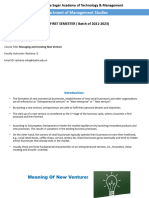Entrepreneurship
Entrepreneurship
Uploaded by
andrewskofinunooCopyright:
Available Formats
Entrepreneurship
Entrepreneurship
Uploaded by
andrewskofinunooCopyright
Available Formats
Share this document
Did you find this document useful?
Is this content inappropriate?
Copyright:
Available Formats
Entrepreneurship
Entrepreneurship
Uploaded by
andrewskofinunooCopyright:
Available Formats
DEFINITIONS
Entrepreneurship - the activity of setting up a business or businesses, taking on financial
risks in the hope of profit
Innovation - Innovation is the process of bringing about new ideas, methods, products, services,
or solutions that have a significant positive impact and value
Creativity - Creativity is the ability to use imagination or original ideas to create something new
and valuable
Franchising Agreement - A Franchise Agreement is a legally binding document that outlines the
terms and conditions for a franchisee to operate a business under the franchisor’s brand
Entrepreneurs - An entrepreneur is someone who creates and/or invests in one or more
businesses, taking on financial risks in the hope of profit
Intrapreneurship - Intrapreneurship is a system that allows an employee to act like an
entrepreneur within a company or other organization
Opportunity Recognition - Opportunity recognition is the process of identifying a new business
opportunity that has the potential to generate economic value and is not currently being
exploited or developed
Crisis Management - Crisis management is the process of identifying a threat to an organization
and its stakeholders in order to mount an effective response to it
ESSAY
Qualities of an entrepreneur
Creativity: Entrepreneurs love creating things and have the ability to use their imagination to
come up with innovative solutions to problems 1.
Self-motivation: Entrepreneurs are typically achievers and go-getters that won’t sit around and
wait for someone to urge them to get things done. They know that if their ideas are to become
reality, they need to put in the effort 1.
Confidence: Entrepreneurs are confident in their abilities and are not afraid to take risks 2.
Passion: Entrepreneurs are passionate about what they do and are driven by a desire to make a
difference 3.
Persistence: Entrepreneurs are persistent and don’t give up easily. They are willing to work hard
and overcome obstacles to achieve their goals 1.
Adaptability: Entrepreneurs are adaptable and can quickly adjust to changing circumstances 2.
Leadership: Entrepreneurs are natural leaders who can inspire and motivate others to achieve
their goals 3.
Vision: Entrepreneurs have a clear vision of what they want to achieve and are able to
communicate that vision to others 2.
Risk-taking: Entrepreneurs are willing to take calculated risks in order to achieve their goals 3.
Discipline: Entrepreneurs are disciplined and have the ability to stay focused on their goals 1.
Factors to consider when citing a business in an area
Accessibility: Does your business rely on frequent deliveries? If so, it’s important to consider
local transport links, particularly main roads and motorways 1.
Visibility: Is your business visible from the road? If not, you may need to invest in signage or
other marketing materials to attract customers 1.
Competition: Are there other businesses in the area that offer similar products or services? If so,
you may need to differentiate yourself by offering something unique or by providing better
customer service 1.
Demographics: What is the demographic makeup of the area? Are there enough potential
customers to support your business1.
Cost: What is the cost of doing business in the area? This includes factors such as rent, utilities,
taxes, and labor costs 1.
Local regulations: Are there any local regulations or zoning laws that could impact your
business? It’s important to research these before making a decision 1.
Local citations: Local citations are any online mentions of a business’ name, address, and phone
number (NAP) 2. They can help your business gain visibility online, boost search engine rankings,
and improve consumer discovery 2. It’s important to ensure your business’ name, address, and
phone number are accurate and the same across all platforms 2.
steps in creative process
Preparation: This stage involves gathering information, identifying sources of inspiration, and
acquiring knowledge about the project or problem at hand 1.
Incubation: During this stage, you let your mind wander and allow your subconscious to work on
the problem. This stage is important because it allows you to approach the problem from a fresh
perspective 2.
Illumination: This is the “aha!” moment when you come up with a new idea or solution. This
stage can be triggered by a variety of things, such as a conversation with a colleague or a walk in
the park 2.
Evaluation: During this stage, you evaluate your idea or solution to determine if it is feasible and
meets the needs of the project or problem 2.
Elaboration: This stage involves refining your idea or solution and turning it into a tangible
outcome. This could involve creating a prototype, writing a business plan, or developing a
marketing strategy 2.
New product development
Idea generation - The first stage of the process is idea generation, which involves brainstorming
and identifying potential product
Idea screening - The next stage is idea screening, where you evaluate the feasibility of each idea
and select the most promising ones
ideas Concept development - Concept development is the third stage, where you develop a
detailed concept for the product, including its features, design, and target market
Business analysis - Business analysis is the fourth stage, where you evaluate the potential
profitability of the product and determine whether it is worth pursuing
Product development - Product development is the fifth stage, where you create a prototype of
the product and test it to ensure that it meets customer needs
Test marketing - Test marketing is the sixth stage, where you launch the product in a limited
market to gauge customer response
Commercialization - Finally, commercialization is the seventh stage, where you launch the
product on a larger scale and begin full-scale production
challenges entrepreneurs face in Ghana
Funding availability and accessibility: Entrepreneurs often face difficulties in accessing funding
to start or grow their businesses 1.
Lack of planning, skilled labor & proper management skills: Many entrepreneurs lack the
necessary skills to manage their businesses effectively, which can lead to poor decision-making
and financial mismanagement 1.
Lack of competitiveness, technology innovation & customer loyalty: Entrepreneurs often
struggle to compete with established businesses and to innovate in their products or services 1.
Legal and regulatory framework and social factors: Entrepreneurs face challenges related to
the legal and regulatory framework, such as high taxes and complex regulations, as well as social
factors such as cultural attitudes towards entrepreneurship
why some entrepreneurs fail
Lack of funding: Many entrepreneurs face difficulties in accessing funding to start or grow their
businesses 1.
Lack of planning, skilled labor & proper management skills: Many entrepreneurs lack the
necessary skills to manage their businesses effectively, which can lead to poor decision-making
and financial mismanagement 1.
Lack of competitiveness, technology innovation & customer loyalty: Entrepreneurs often
struggle to compete with established businesses and to innovate in their products or services 1.
Legal and regulatory framework and social factors: Entrepreneurs face challenges related to
the legal and regulatory framework, such as high taxes and complex regulations, as well as social
factors such as cultural attitudes towards entrepreneurship 1.
Not having enough money: Lack of money is the simplest and most straightforward reason any
business fails 1. Whether they self-finance, get a bank loan or take the “Shark Tank” approach
and get partners and investors, many businesses fail before really getting started because they
are not prepared with the capital it takes to operate a new business 1.
Not knowing your market: Entrepreneurs must be able to answer questions about their market
in order to run a successful business. If they do not fully understand who their customers are,
what they want and where else they can get it, they will be doomed to fail 1.
Lack of vision: Businesses without well-thought-out, long-term and short-term goals will fail
because they don’t have clear success benchmarks along the way 1.
importance of crisis management plan
Risk assessment: A crisis management plan can help organizations identify potential risks and
threats before they occur, allowing them to take proactive measures to prevent or mitigate the
impact of a crisis 3.
Improved decision-making: A crisis management plan can provide a framework for decision-
making during a crisis, helping organizations make informed decisions quickly and effectively 3.
Reduced downtime: A crisis management plan can help organizations minimize downtime
during a crisis, allowing them to resume normal operations as quickly as possible 1.
Protection of reputation: A crisis management plan can help organizations protect their
reputation by responding quickly and effectively to a crisis, minimizing negative publicity and
damage to the brand 1.
factors that hinder creativity
Lack of time: Creativity requires time and space to develop. When people are too busy or
stressed, they may not have the mental energy to be creative 1.
Fear of failure: Fear of failure can prevent people from taking risks and trying new things. This
can stifle creativity and innovation 1.
Lack of resources: Creativity often requires resources such as money, materials, and equipment.
When these resources are scarce, it can be difficult to be creative 1.
Negative feedback: Negative feedback can be demotivating and can make people feel like their
ideas are not valued. This can discourage creativity 1.
Lack of diversity: Creativity thrives on diversity of thought and perspective. When people are
surrounded by others who think and act like them, it can be difficult to generate new ideas 1.
Rigid thinking: Rigid thinking can limit creativity by preventing people from considering new
ideas or approaches 1.
Lack of motivation: Creativity requires motivation and passion. When people lack motivation, it
can be difficult to be creative 1.
You might also like
- The Guide To The Product ManagementDocument1,263 pagesThe Guide To The Product ManagementDmitriy YagolaNo ratings yet
- Business Proposal: University of Cebu - Banilad Senior High School Department Business MathDocument5 pagesBusiness Proposal: University of Cebu - Banilad Senior High School Department Business Mathymir subjects ofNo ratings yet
- Unit - Iii NotesDocument5 pagesUnit - Iii NotesanamikaNo ratings yet
- E-Ship Unit 2Document6 pagesE-Ship Unit 2atankwadi7987No ratings yet
- ENTREPRENEURSHIP DEVELOPMENT QnA AnsDocument12 pagesENTREPRENEURSHIP DEVELOPMENT QnA AnsSuzi GamingNo ratings yet
- ED Unit 1 and 2Document6 pagesED Unit 1 and 2Vishika jainNo ratings yet
- SOSC5 thc10 MidtermDocument7 pagesSOSC5 thc10 MidtermRodalyn PasamonteNo ratings yet
- Notes 3Document8 pagesNotes 3Peter MorrisNo ratings yet
- IMPROVE BUSINESS PRACTICE OnlineDocument19 pagesIMPROVE BUSINESS PRACTICE Onlinenatnael danielNo ratings yet
- Eps Unit 1Document31 pagesEps Unit 1Vanshika AgrawalNo ratings yet
- Module - Entrepreneurship and Service Marketing - C. KatsandeDocument59 pagesModule - Entrepreneurship and Service Marketing - C. KatsandeChrispen KatsandeNo ratings yet
- POE Notes StudentDocument74 pagesPOE Notes Studentpaij6328No ratings yet
- Entrepreneurial Skills Cbet MKTDocument19 pagesEntrepreneurial Skills Cbet MKTnguginelson9052No ratings yet
- Entrepreneurship NotesDocument14 pagesEntrepreneurship NoteskuchbhiNo ratings yet
- ENTREPmoduleDocument6 pagesENTREPmoduleElla MaxineNo ratings yet
- Entrepreunership CH - 1Document24 pagesEntrepreunership CH - 1Hussen MohammedNo ratings yet
- Entrep ReviewerDocument11 pagesEntrep ReviewerDynah Janine SemanaNo ratings yet
- Unit-1 Entrepreneurship Introduction and ProcessDocument12 pagesUnit-1 Entrepreneurship Introduction and Processarkabhattacharya57No ratings yet
- Group-2-PROBLEM SOLVING STRATEGIESDocument53 pagesGroup-2-PROBLEM SOLVING STRATEGIESApple DocasaoNo ratings yet
- E&i Material-C.gDocument101 pagesE&i Material-C.gbramahaiahdomaNo ratings yet
- Chapter 2Document34 pagesChapter 2adNo ratings yet
- Entrepreneurship New STUDENTDocument32 pagesEntrepreneurship New STUDENTJeftonNo ratings yet
- Answer Booklet (HASKOUR IBRAHIM)Document6 pagesAnswer Booklet (HASKOUR IBRAHIM)ibrahim mohamed haskoorNo ratings yet
- Self EmploymentDocument25 pagesSelf EmploymentsarahNo ratings yet
- Module 3Document22 pagesModule 3ನಂದನ್ ಎಂ ಗೌಡNo ratings yet
- Business PlanDocument26 pagesBusiness PlanLolaNo ratings yet
- Tle 10Document4 pagesTle 10Paul RunnerNo ratings yet
- Sakshi Gaikar SYBMS A 68 BPEM AssighnmentDocument8 pagesSakshi Gaikar SYBMS A 68 BPEM AssighnmentAaon EnterprisesNo ratings yet
- Entrep PPT 2Document29 pagesEntrep PPT 2slj08166No ratings yet
- Developing Ideas and Business OpportunitiesDocument5 pagesDeveloping Ideas and Business Opportunitiesairabernabeee101No ratings yet
- TLE Reviewer 4th QuarterDocument5 pagesTLE Reviewer 4th QuarterDhanica Rhaine VillanuevaNo ratings yet
- Chapter 03 - Entrepreneurship, Franchising and Small BusinessDocument18 pagesChapter 03 - Entrepreneurship, Franchising and Small BusinessMahmud TazinNo ratings yet
- Recognizing The Potential MarketDocument4 pagesRecognizing The Potential MarketSheena Mari Uy Ellevera80% (5)
- Entrepreneurship Unit-1Document17 pagesEntrepreneurship Unit-1shikhaNo ratings yet
- Entrepreneurship Unit 1Document13 pagesEntrepreneurship Unit 1Sparsh BansalNo ratings yet
- IEM Sem3 SyllabusDocument44 pagesIEM Sem3 Syllabusskspankaj08No ratings yet
- Business Assignment 2023Document11 pagesBusiness Assignment 2023zoeyschippers99No ratings yet
- Entrepreneurship 12: Scanning The Marketing EnvironmentDocument9 pagesEntrepreneurship 12: Scanning The Marketing EnvironmentmykoNo ratings yet
- ENTREPRENEURSHIPDocument5 pagesENTREPRENEURSHIPMarcela EuniceNo ratings yet
- Chapter 5Document33 pagesChapter 5orlandanikko7No ratings yet
- Ent Unit 2Document69 pagesEnt Unit 2Samuel JosephNo ratings yet
- Lecture B.tech Civil Eng Sem 1Document127 pagesLecture B.tech Civil Eng Sem 1gokahdav3No ratings yet
- Entrepreneurship Development-2Document18 pagesEntrepreneurship Development-2Ansh TalejaNo ratings yet
- EntrepreneurshipDocument5 pagesEntrepreneurshipAutumn Johnson100% (1)
- Ed MicroDocument15 pagesEd Microsurajlakhan90No ratings yet
- BPolicyDocument5 pagesBPolicymudsarjabbar628No ratings yet
- Entrepreneurship ModuleDocument10 pagesEntrepreneurship ModuleMeryll CeaNo ratings yet
- Chapter 2 - Starting A Business PDFDocument37 pagesChapter 2 - Starting A Business PDFClaire Evann Villena EboraNo ratings yet
- Business Study, Business Plan PresentationDocument7 pagesBusiness Study, Business Plan Presentationmphom4672No ratings yet
- Lesson 4: Entrepreneurshi P: Entrepreneurial MindsetDocument24 pagesLesson 4: Entrepreneurshi P: Entrepreneurial Mindsetmary kia pulveraNo ratings yet
- Concept of Entrepreneur: Key TakeawaysDocument18 pagesConcept of Entrepreneur: Key TakeawaysVishwas Srivastava 371No ratings yet
- UNIT 1 EntrepreneurshipDocument18 pagesUNIT 1 Entrepreneurshipnadia100% (1)
- Ent 101 Lesson 3Document38 pagesEnt 101 Lesson 3May AnneNo ratings yet
- Admas UniversityDocument14 pagesAdmas Universitylastever618No ratings yet
- Entrepreneurship FOR Freshman Students: By: Debela H February 2021 G.CDocument29 pagesEntrepreneurship FOR Freshman Students: By: Debela H February 2021 G.CYohannis KidanuNo ratings yet
- Entrepreneurship Unit 1Document24 pagesEntrepreneurship Unit 1Bushra Allah wasayaNo ratings yet
- Unit 4 Entrepreneur SkillsDocument22 pagesUnit 4 Entrepreneur SkillsShubhangi SinghNo ratings yet
- LMCarpentryLesson1 22024 2025Document29 pagesLMCarpentryLesson1 22024 2025shekinahavila17No ratings yet
- Entrepreneurship ExamDocument24 pagesEntrepreneurship ExamzyleahlsNo ratings yet
- Ent QuestionBankDocument20 pagesEnt QuestionBanktripatthiadityaNo ratings yet
- Entrepreneur Suite: Building a Successful Startup from ScratchFrom EverandEntrepreneur Suite: Building a Successful Startup from ScratchNo ratings yet
- Borderfree T2A Who Are The Key PlayersDocument14 pagesBorderfree T2A Who Are The Key PlayersPaula Rene PASCUALNo ratings yet
- Printed Tshirt BusinessDocument30 pagesPrinted Tshirt BusinessSurajNo ratings yet
- CV Emilio Ferrera EnglishDocument2 pagesCV Emilio Ferrera Englisheferrera67No ratings yet
- Thesis Brand LoyaltyDocument7 pagesThesis Brand Loyaltyafknrbsaw100% (2)
- MGMT 221 6.3 E Commerce Mobile Commerce Merrill BabuDocument4 pagesMGMT 221 6.3 E Commerce Mobile Commerce Merrill BabuWilson LohNo ratings yet
- Yashdeep Dabas - Resume 2022Document1 pageYashdeep Dabas - Resume 2022chirguNo ratings yet
- UntitledDocument6 pagesUntitledsiphiwo dlaminiNo ratings yet
- BasundariDocument12 pagesBasundarisuperkjlaundryNo ratings yet
- Brenda Charles: Specializing in New Business Development and Market ExpansionDocument2 pagesBrenda Charles: Specializing in New Business Development and Market Expansionsantosh kumarNo ratings yet
- Implementation of Marketing Strategy On Super Asia: (Pest & Swot Analysis, BCG Matrix & StrategyDocument18 pagesImplementation of Marketing Strategy On Super Asia: (Pest & Swot Analysis, BCG Matrix & StrategyKainat TariqNo ratings yet
- Ex - 1501 - 150430 - LB11 SRP - ExportDocument105 pagesEx - 1501 - 150430 - LB11 SRP - ExportFarid AbushovNo ratings yet
- Module 5Document28 pagesModule 5nucleya nxsNo ratings yet
- Business Model Canvas TemplateDocument1 pageBusiness Model Canvas TemplateCalvin BuraNo ratings yet
- Session 3-4 Opportunity Analysis For Digital Business and E-CommerceDocument18 pagesSession 3-4 Opportunity Analysis For Digital Business and E-CommerceElkana AntonioNo ratings yet
- These Are The Best Times To Post On Social MediaDocument4 pagesThese Are The Best Times To Post On Social MediaAsun MerdierNo ratings yet
- Pepsi Swag Se Solo - The New WayDocument8 pagesPepsi Swag Se Solo - The New WaysanketNo ratings yet
- CV - Edward VG Barus - Last UpdatedDocument10 pagesCV - Edward VG Barus - Last UpdatedHSE Wana Dirga NusantaraNo ratings yet
- PTS3216 Industrial Training Final Report August 2020 Semester, 2/20/34 Academic SessionDocument46 pagesPTS3216 Industrial Training Final Report August 2020 Semester, 2/20/34 Academic SessionMuhamad RiskiNo ratings yet
- Supply Chain Management - Text and Cases-Pearson Education (2011) - V. v. SopleDocument557 pagesSupply Chain Management - Text and Cases-Pearson Education (2011) - V. v. SopleNguyễn Thị Khánh Hoà100% (3)
- Domino's PizzaDocument40 pagesDomino's Pizzaabdelrahman.hashem.20100% (2)
- Marketing Plan of Juice CompanyDocument12 pagesMarketing Plan of Juice CompanyZakir Khan82% (11)
- The Key Players in Indonesia's Beauty Commerce Space (Update) - Tech in AsiaDocument9 pagesThe Key Players in Indonesia's Beauty Commerce Space (Update) - Tech in AsiaWilhendra AkmamNo ratings yet
- Pre-Feasibility Study: Institute of Management Studies University of PeshawarDocument10 pagesPre-Feasibility Study: Institute of Management Studies University of PeshawarMX CreationNo ratings yet
- 2400-Article Text-8965-1-10-20200131Document14 pages2400-Article Text-8965-1-10-20200131Daffa AfrialNo ratings yet
- Myntra Brand PrismDocument8 pagesMyntra Brand PrismSudhansu VatsNo ratings yet
- Martilla James 1977Document4 pagesMartilla James 1977Lien Herliani KusumahNo ratings yet
- Activity 1 MarketingDocument2 pagesActivity 1 MarketingMerari ValenciaNo ratings yet
- Organizational Structure That Supports Marketing ActivitiesDocument7 pagesOrganizational Structure That Supports Marketing ActivitiesTolulope Dorcas0% (1)

























































































